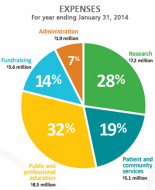For a while, I was worried that I may have been unduly harsh towards the ALS Foundation with my previous comments. So I decided to do a little more research to see if an apology was due.
But now that I've looked at their
IRS Form-990 filing and examined the information contained therein a bit more closely, I'm less convinced they're the best non-profit to be contributing to for ALS research.
(Those of you with a financial or accounting background might want to do a little analysis and read between the lines in a few places on that 990. Check out the salary and compensation section (p. 8 & 9); and the note on p.29 regarding the perpetual endowment whose earned income makes up part of the 28% going to research. Interesting huh?)
Their officially published numbers also paint a fairly dismal picture, with
less than half of all funds making it to research (28%) or patient services (19%).
 Ice Bucket Challenge...You all got nominated!
Ice Bucket Challenge...You all got nominated!And while the public and professional education wedge seems to indicate a healthy 32% going to...um...education, I'm not sure how to interpret that since the government gives registered charities fairly broad leeway as to what to categorize as 'fundraising' or 'marketing' as opposed to 'educational' communications and publications. This is something which has been a source of controversy (in the US) over the years since much of what gets called 'educational' is often little more than a thinly disguised fundraising effort.
So...bottom line?
I think ALS is a serious health issue that needs research and deserves our dollars.
But...is the ALS Foundation the best way to contribute to the effort? Maybe. But I'd like to see a little more of what they get actually going to fix the problem. My rule of thumb for charitable giving is a distribution breakdown where 75% or better of
all monies received goes directly to the cause, and administration expenses are held at or below 6%.
But that's me.

